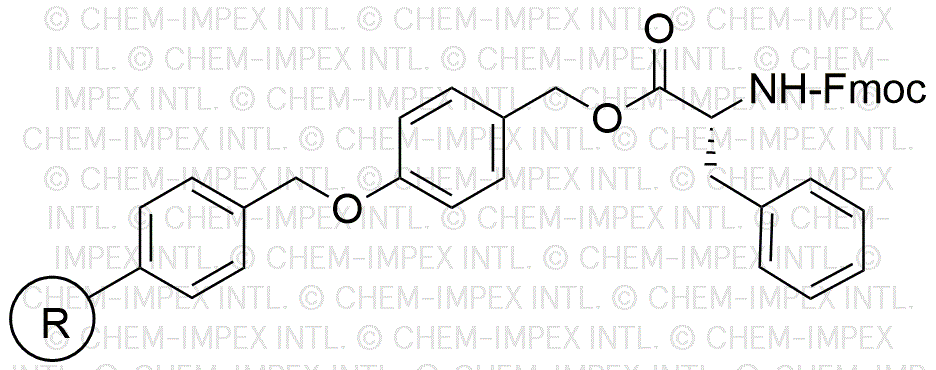Fmoc-D-phenylalanine 4-alkoxybenzyl alcohol resin is widely utilized in research focused on:
- Peptide Synthesis: This resin is essential in solid-phase peptide synthesis, allowing researchers to efficiently create custom peptides for various applications, including drug development and biochemical studies.
- Drug Discovery: By facilitating the synthesis of peptide libraries, it aids pharmaceutical companies in identifying potential drug candidates, streamlining the process of finding effective treatments.
- Bioconjugation: The resin can be used to attach peptides to other biomolecules, enhancing the development of targeted therapies and diagnostic tools in the biomedical field.
- Research in Neuroscience: Custom peptides synthesized using this resin can be utilized to study neuropeptide interactions, contributing to advancements in understanding neurological disorders.
- Material Science: Its properties allow for the creation of functional materials that can be used in sensors and drug delivery systems, showcasing versatility beyond traditional applications.
Información general
Propiedades
Seguridad y normativas
Aplicaciones
Fmoc-D-phenylalanine 4-alkoxybenzyl alcohol resin is widely utilized in research focused on:
- Peptide Synthesis: This resin is essential in solid-phase peptide synthesis, allowing researchers to efficiently create custom peptides for various applications, including drug development and biochemical studies.
- Drug Discovery: By facilitating the synthesis of peptide libraries, it aids pharmaceutical companies in identifying potential drug candidates, streamlining the process of finding effective treatments.
- Bioconjugation: The resin can be used to attach peptides to other biomolecules, enhancing the development of targeted therapies and diagnostic tools in the biomedical field.
- Research in Neuroscience: Custom peptides synthesized using this resin can be utilized to study neuropeptide interactions, contributing to advancements in understanding neurological disorders.
- Material Science: Its properties allow for the creation of functional materials that can be used in sensors and drug delivery systems, showcasing versatility beyond traditional applications.
Documentos
Hojas de datos de seguridad (HDS)
La SDS proporciona información de seguridad completa sobre la manipulación, el almacenamiento y la eliminación del producto.
Especificación del producto (PS)
La PS proporciona un desglose completo de las propiedades del producto, incluida la composición química, el estado físico, la pureza y los requisitos de almacenamiento. También detalla los rangos de calidad aceptables y las aplicaciones previstas del producto.
Certificados de análisis (COA)
Busque certificados de análisis (COA) ingresando el número de lote del producto. Los números de lote y de partida se pueden encontrar en la etiqueta de un producto después de las palabras "Lote" o "Lote".
Número de catálogo
Número de lote/lote
Certificados de origen (COO)
Este certificado de origen confirma el país en el que se fabricó el producto y también detalla los materiales y componentes utilizados en él y si se deriva de fuentes naturales, sintéticas u otras fuentes específicas. Este certificado puede ser necesario para cumplir con las normativas aduaneras, comerciales y regulatorias.
Número de catálogo
Número de lote/lote
Hojas de datos de seguridad (HDS)
La SDS proporciona información de seguridad completa sobre la manipulación, el almacenamiento y la eliminación del producto.
DownloadEspecificación del producto (PS)
La PS proporciona un desglose completo de las propiedades del producto, incluida la composición química, el estado físico, la pureza y los requisitos de almacenamiento. También detalla los rangos de calidad aceptables y las aplicaciones previstas del producto.
DownloadCertificados de análisis (COA)
Busque certificados de análisis (COA) ingresando el número de lote del producto. Los números de lote y de partida se pueden encontrar en la etiqueta de un producto después de las palabras "Lote" o "Lote".
Número de catálogo
Número de lote/lote
Certificados de origen (COO)
Este certificado de origen confirma el país en el que se fabricó el producto y también detalla los materiales y componentes utilizados en él y si se deriva de fuentes naturales, sintéticas u otras fuentes específicas. Este certificado puede ser necesario para cumplir con las normativas aduaneras, comerciales y regulatorias.

